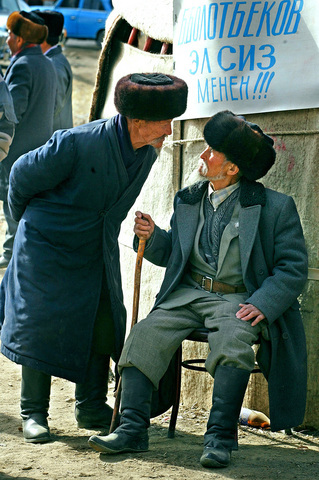The revolution has a name, even though it hasn't happened.
Ahead of tomorrow's parliamentary elections in Kyrgyzstan, speculation is high that this remote, mountainous ex-Soviet republic is on the verge of an uprising like those in Georgia and Ukraine that were sparked by election fraud.

PHOTO: AP
News media, drawing stylistically on Georgia's "Rose Revolution" and Ukraine's "Orange Revolution," have begun calling Kyrgyzstan's national uprising the "Tulip Revolution."
There isn't a trace of Kyrgyzstan's favorite flower to be seen amid February's snows, but signs of discontent are rising.
The vote is a key test for Kyrgyzstan, once seen as an "island of democracy" in former Soviet Central Asia but now troubled by increasing complaints of repression. It will be closely watched by international observers and domestic politicians not only for its own importance, but as a harbinger of how the October presidential election is likely to be conducted.
The vote also is likely to be watched closely by Washington and the Kremlin, which have strategic interests in stability in Kyrgyzstan, where both Russia and the US have military bases.
Ahead of the vote, the most volatile issue has not been the prospect of vote fraud, as was the case in Ukraine and Georgia, but the blocking of prominent politicians from running at all. Demonstrators backing two disqualified candidates blocked key roads this week, shutting down a main trade corridor to China and slowing production at the Kumtor gold mine, a key piece of the economy of the country of 5 million.
Another leading opposition figure, Roza Otunbayeva, was denied registration as a candidate on the grounds that she did not meet the requirement of having been a resident for the last five years -- but the reason she couldn't meet it was because she had been one of Kyrgyzstan's top diplomats, posted to Britain and the US as well as working as a UN envoy for Abkhazia.
Otunbayeva wanted to run for a seat in the same district where Akayev's daughter, Bermet, is a candidate. That added to concerns the government was using legal hairsplitting to marginalize Otunbayeva and she now is seen as likely a central figure if protests break out.
But Otunbayeva denies that she and her colleagues in the Ata-Jurt political movement are preparing to take to the streets.
"We in the opposition isn't talking about a revolution of any kind," she said recently during a trip to Moscow. "We're talking about a peaceful, constitutional change of power."
Such a transition once seemed likely in Kyrgyzstan. Akayev, who has led the country since independence from the Soviet Union, was regarded as the most reform-minded of the Central Asian leaders and the country won praise for its comparative openness.
But Akayev in recent years has shown increasing signs of cracking down. In 2002, his reputation was tarnished after police killed six demonstrators who were protesting the arrest of an opposition lawmaker.

A fire caused by a burst gas pipe yesterday spread to several homes and sent a fireball soaring into the sky outside Malaysia’s largest city, injuring more than 100 people. The towering inferno near a gas station in Putra Heights outside Kuala Lumpur was visible for kilometers and lasted for several hours. It happened during a public holiday as Muslims, who are the majority in Malaysia, celebrate the second day of Eid al-Fitr. National oil company Petronas said the fire started at one of its gas pipelines at 8:10am and the affected pipeline was later isolated. Disaster management officials said shutting the

US Vice President J.D. Vance on Friday accused Denmark of not having done enough to protect Greenland, when he visited the strategically placed and resource-rich Danish territory coveted by US President Donald Trump. Vance made his comment during a trip to the Pituffik Space Base in northwestern Greenland, a visit viewed by Copenhagen and Nuuk as a provocation. “Our message to Denmark is very simple: You have not done a good job by the people of Greenland,” Vance told a news conference. “You have under-invested in the people of Greenland, and you have under-invested in the security architecture of this

UNREST: The authorities in Turkey arrested 13 Turkish journalists in five days, deported a BBC correspondent and on Thursday arrested a reporter from Sweden Waving flags and chanting slogans, many hundreds of thousands of anti-government demonstrators on Saturday rallied in Istanbul, Turkey, in defence of democracy after the arrest of Istanbul Mayor Ekrem Imamoglu which sparked Turkey’s worst street unrest in more than a decade. Under a cloudless blue sky, vast crowds gathered in Maltepe on the Asian side of Turkey’s biggest city on the eve of the Eid al-Fitr celebration which started yesterday, marking the end of Ramadan. Ozgur Ozel, chairman of the main opposition Republican People’s Party (CHP), which organized the rally, said there were 2.2 million people in the crowd, but

JOINT EFFORTS: The three countries have been strengthening an alliance and pressing efforts to bolster deterrence against Beijing’s assertiveness in the South China Sea The US, Japan and the Philippines on Friday staged joint naval drills to boost crisis readiness off a disputed South China Sea shoal as a Chinese military ship kept watch from a distance. The Chinese frigate attempted to get closer to the waters, where the warships and aircraft from the three allied countries were undertaking maneuvers off the Scarborough Shoal — also known as Huangyan Island (黃岩島) and claimed by Taiwan and China — in an unsettling moment but it was warned by a Philippine frigate by radio and kept away. “There was a time when they attempted to maneuver